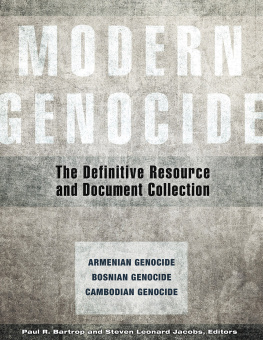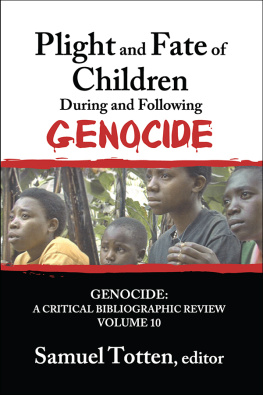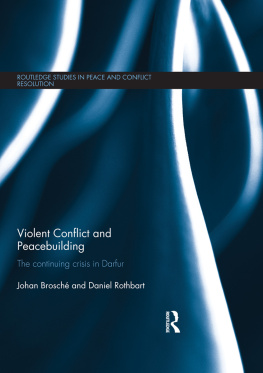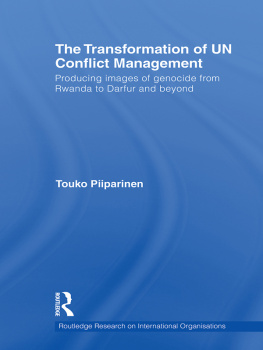Darfur Genocide
THE ESSENTIAL REFERENCE GUIDE
Alexis Herr, Editor

Copyright 2020 by ABC-CLIO, LLC
All rights reserved. No part of this publication may be reproduced, stored in a retrieval system, or transmitted, in any form or by any means, electronic, mechanical, photocopying, recording, or otherwise, except for the inclusion of brief quotations in a review, without prior permission in writing from the publisher.
Library of Congress Cataloging-in-Publication Data
Names: Herr, Alexis, editor.
Title: Darfur genocide : the essential reference guide / Alexis Herr, editor.
Description: Santa Barbara : ABC-CLIO, 2020. | Includes bibliographical references and index.
Identifiers: LCCN 2019037092 (print) | LCCN 2019037093 (ebook) | ISBN 9781440865503 (cloth) | ISBN 9781440865510 (ebook)
Subjects: LCSH: SudanHistoryDarfur Conflict, 2003 | SudanPolitics and government1985 | GenocideSudanDarfur. | Darfur (Sudan)Ethnic relations. | Ethnic conflictSudanDarfur.
Classification: LCC DT159.6.D27 D376 2020 (print) | LCC DT159.6.D27 (ebook) | DDC 962.404/3dc23
LC record available at https://lccn.loc.gov/2019037092
LC ebook record available at https://lccn.loc.gov/2019037093
ISBN: 978-1-4408-6550-3 (print)
978-1-4408-6551-0 (ebook)
24 23 22 21 20 1 2 3 4 5
This book is also available as an eBook.
ABC-CLIO
An Imprint of ABC-CLIO, LLC
ABC-CLIO, LLC
147 Castilian Drive
Santa Barbara, California 93117
www.abc-clio.com
This book is printed on acid-free paper 
Manufactured in the United States of America
I dedicate this book to all the genocide survivors who have shared their experiences with me, and to all the victims of the Darfur Genocide whose stories have never been heard.
Contents
List of Entries
Abdel Shafi, Ahmad
African Union
African Union Mission in Sudan
African UnionUnited Nations Mission in Darfur
Amnesty International
Annan, Kofi
Anyidoho, Henry Kwami
Banda, Abdallah
Bashir, Omar Hassan Ahmed al
Bassol, Djibril
Black Book, The
British Involvement in Darfur
Cheadle, Don
Child Soldiers
Clooney, George
Coalition for International Justice
Comprehensive Peace Agreement
Damon, Matt
Darfur
Darfur Atrocities Documentation Project
Darfur Development Front
Denial of the Darfur Genocide
Dinka
Diraige, Ahmed Ibrahim
Doha Document for Peace in Darfur
Egeland, Jan
Egyptian Involvement in Darfur
Enough Project
Famine of 19841985
Farrow, Mia
Fur
Gambari, Ibrahim
Garang, John
Gosh, Salah Abdallah
Harun, Ahmad
Hilal, Musa
Hussein, Abdel Raheem Muhammad
Ibrahim, Khalil
Itno, Idriss Dby
Janjaweed
Jihad
Jolie, Angelina
Justice and Equality Movement
Kapila, Mukesh
Khartoum
Kiir, Salva
Kristof, Nicholas
Kushayb, Ali
Liberation and Justice Movement
Lost Boys and Girls of Sudan
Massalit
McGrady, Tracy
Minawi, Minni
National Islamic Front
Nuba
Power, Samantha
Prendergast, John
Prosper, Pierre-Richard
Rape
Reeves, Eric
Religion
Satellite Sentinel Project
Save Darfur Coalition
South Sudan
Steidle, Brian
Sudan
Sudanese Civil Wars
Sudan Liberation Army
Sudan Peoples Liberation Movement/Army
Talisman Energy Corporation
Turabi, Hassan al
United Nations Commission of Inquiry on Darfur
United Nations Convention on the Prevention and Punishment of the Crime of Genocide
United Nations Mission in the Sudan
United States Involvement in Darfur
Wahid, Abdel
Wallace, Gretchen Steidle
Weintraub, Jerry
What Is the What
Wiesel, Elie
Zaghawa
List of Primary Documents
1. U.S. Department of State Describes the Janjaweed Militia (March 6, 2004)
2. U.S. Department of State Memo on Genocide in Darfur (June 25, 2004)
3. U.S. Government Calls for International Resolve to Combat Darfur Genocide (July 2, 2004)
4. John Garang: Speech at Signing of Comprehensive Peace Agreement (January 10, 2005)
5. Excerpts from the United Nations Commission of Inquiry on Darfur (January 25, 2005)
A. Establishment of the Commission
B. Do Crimes Perpetrated in Darfur Constitute Genocide?
C. Justice and Equality Movement
D. Sudan Liberation Movement/Army
E. The Janjaweed
F. The Commissions Recommendations Concerning Measures Designed to Ensure that Those Responsible are Held Accountable
6. Sudan: Accountability for War Crimes, U.S. Department of State Press Guidance (January 28, 2005)
7. John Garang: Speech on Social Contract for Sudan (March 5, 2005)
8. Darfur Peace and Accountability Act (2006)
Preface
All genocides have a past, present, and future. In our quest to learn about the Darfur Genocide, it is imperative to remember this simple truth in order to avoid the common error of mistaking dates as definitive, statistics as representative, and accumulated knowledge as understanding. Ultimately, any true study of genocide requires its students, myself included, to grapple with a reality that is too tangled to unwind and too dark to fully illuminate.
When Western media outlets first reported on the eruption of violence in the Darfur region of Western Sudan in 2003, they attempted to simply describe the seed of the conflict as racial violence so that their readers could comprehend the confrontation that U.S. secretary of state Colin Powell would later call a genocide. Journalists reported that Arabs were killing Africans, thus framing the violence as racially driven.
The explanation of racial hatred was not a foreign concept for Westerners, even if Darfur and Sudan required an internet search to locate. Ever since images of the Holocaust (19391945) entered into our collective consciousness through print and visual media, the notion of genocide has had a strong association with the attempted annihilation of an entire people. The killing of the Tutsis by the Hutus in Rwanda (1994) reinforced this image of racially or ethnically motivated genocide. So, the explanation of Darfur as a genocide motivated by racial hatred brought familiar clarity for those in the West about an otherwise distant conflict.
But this oversimplification allowed for uninformed assumptions about a people and a place, due in part to the broader global context. The world had been forever changed just two years before the genocide began in Darfur, when al-Qaeda terrorists launched an attack on the West on September 11, 2001, murdering nearly 3,000 people from more than fifty-seven countries in a single day. For many years, Osama bin Laden, the mastermind of the September 11 attacks, was painted as the poster child for Islamic extremism and the so-called Arab world was depicted as the greatest enemy of Western Christianity and democracy.
Western confusion about Sudan was made worse by the fact that bin Laden had a history in the country, having spent years nurturing his nascent terrorist group there. Sudanese president Hassan al-Turabi had welcomed bin Laden to the country in December 1991, and as he set up terrorist training camps, Turabi intensified his own Islamic extremism through his party, the National Islamic Front (NIF). As one scholar has aptly explained, if al-Qaeda was not actually born in Sudan, it certainly developed its modus operandi in the bosom of al-Turabis Islamic revolution (Crockett 2010: 122123). Thus, when reporters wrote in 2003 that Sudanese Arabs were murdering Africans, many saw the conflict through the lens of Western Islamophobia.
Next page







